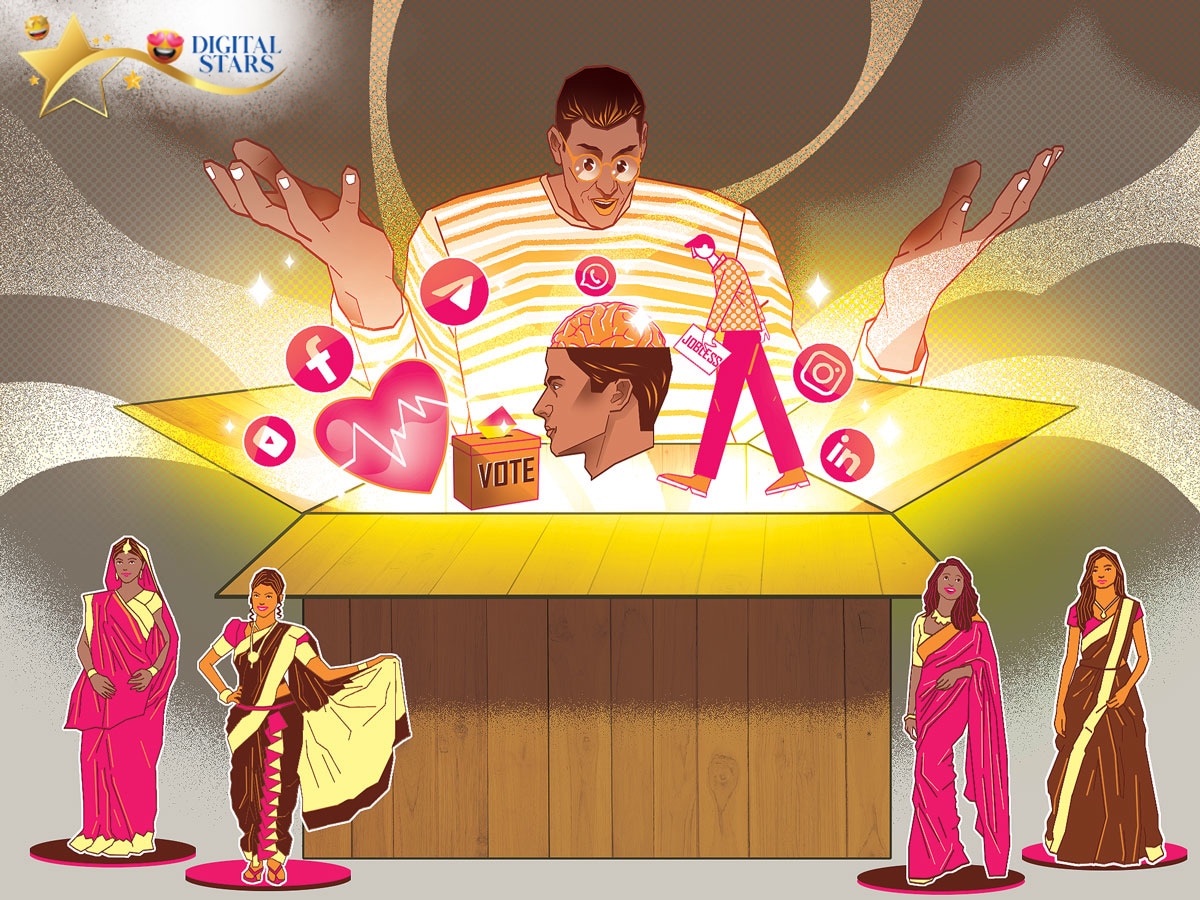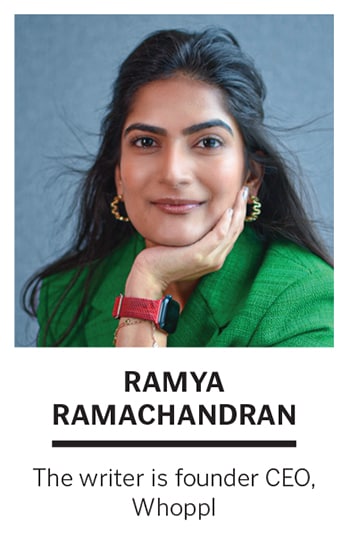 Illustration: Chaitanya Dinesh Surpur
Illustration: Chaitanya Dinesh Surpur
The new breed of cultural architects—social media influencers—harness the burgeoning power of Instagram, Snapchat and YouTube. The 21st-century merchants are influencing millions with one tap, with their ideas, trends and lifestyle. They are moving towards becoming the vanguards of the consumer culture shift, both socially and beyond.
 From fashion and beauty to health, travel and politics, influencers are setting a new agenda, subtly steering their followers’ choices and inclinations.
From fashion and beauty to health, travel and politics, influencers are setting a new agenda, subtly steering their followers’ choices and inclinations.
Thanks to social media, influencers are taking their skills worldwide and putting India back on the world map, one post at a time. Their communication consists of a fine blend that makes it palatable to transcend borders, going places where one must not have imagined in their wildest dreams a few years ago. Is this hinting towards a new form of globalisation, heralded by the new-age merchants?
In this click era, influencers are no longer transactional. Their positive role and impact are felt in arenas such as mental health awareness, where they highlight its importance and offer people a platform to talk and vent their emotions. They also bring attention to the extent of sustainability, feminism and animal welfare, and the likes. But there has also been a significant rise in blind faith, which has its challenges. As they say, with great power comes great responsibility. This power, though a tool for positive impact, bears a significant ethical burden. Surprisingly, many are carrying this burden graciously and responsibly, without losing their foundation.
Aishwarya Subramanyam, popularly known as ‘Otherwarya’, is one of the most vocal influencers, writing or doing what most are afraid to do. And she does so while being incredibly self-aware. She initiated what most would shy away from or wouldn’t ever dare to. A few months ago, she launched a sisterhood cohort across the country, splitting it city-wise, in the form of a WhatsApp group, for women. This cohort didn’t stay restricted to the Indian sandbox, but expanded worldwide with groups forming across Europe and America, women conducting occasional meetups creating small tight-knit communities among themselves, reviving the cherishing bond of sisterhood in these trying times.
The art of saree draping was watching its slow death as most A-listers and celebrities started relying on professionals or wanted to explore the global fashion playground. The new wave of influencers like Trinetra Haldar Gummaraju and Natasha Thasan pulled it out from the quicksand and made the saree more accessible and trendier with some unconventional draping styles.
Bollywood films laid the foundation of making European and American travel look aspirational and bucket-list worthy, now influencers are holding the reins of creating the same cultural phenomena. As per a 2024 McKinsey Report, Gen-Zs are set to help India’s travel spending expand by 9 percent a year. Moreover, India’s domestic travel market could become the world’s fourth largest by 2030, as per the report titled ‘The State of Tourism and Hospitality 2024’. Curious explorers are now ditching the good old Lonely Planet travel guides and going by travel influencers’ recommendations that not just offer stunning visuals but also render a more practical knowledge, maintaining authenticity, honest takeaways, and insightful observations, all tied in with engaging storytelling. We’re watching them travel in real time, fostering a humanising approach to decision-making.
Remember last year during the summer when a whole herd of Indians wanted to flock to France, making it the most admired and all-time favourite destination? The same can be said in great volumes about the impact influencers created for the iconic ‘The Eras Tour’ by American singer-songwriter Taylor Swift. Influencers across a plethora of categories and age groups like Vishnu Kaushal, Diksha Rawat, Agasthya Shah and Apoorva were seen not only attending the concert in various parts of the world but also choosing outfits as per Taylor’s era. Indians are now proudly a significant part of a worldwide spectacle.
The 2024 Lok Sabha elections will remain a testament to how influencers became a powerful tool in trying to shape the voters’ behaviour and mindsets. The shift in the global political landscape, its impact on the Indian space and the current political climate have all contributed to more open and honest discussions.
Click here for India’s Top 100 Digital Stars
We saw a pool of influencers that unpacked social and financial issues while unravelling topics like unemployment, lack of job security, electoral bonds and many more. The traditional media’s abdication of its role has created a vacuum that social media has filled. We won’t be surprised if the next generation of influencers is seen stepping into the political dimension.
Influencers are also breaking away from conventional career paths, showcasing alternative definitions of success that prioritise passion, creativity, and digital entrepreneurship. If more people, especially younger generations, follow these examples, it could reshape traditional career trajectories and societal views on education, work-life balance, or even financial success. Influencers are demonstrating that success is not solely measured by material wealth or a prestigious job, but by personal fulfillment and the ability to make a positive impact. They are now making room for a more acceptable and inclusive environment since the demand for more real conversations and nuanced storytelling has risen. Dialogues on sensitive or hush-hush issues that have been stigmatised or ignored in the past are making digital content more memorable and impactful. They are discussing everything under the sun—plastic surgery, Botox, hustle culture, Ozempic, past trauma, exploitations, prejudices. They are breaking away from the narcissist template to compassionate and empathising leaders, who are ready to hear their followers’ conversations and stories.
With their global reach, influencers are amplifying diversity, using their platforms to showcase various cultural festivals, traditions, and practices. They are acting as a catalyst to encourage cross-cultural appreciation. The chai and whiskey nation is slowly turning into a ‘Matcha’ and ‘soju’ enthusiast. Influencers are now those cultural agents that have swept millennials and Gen-Zs off their feet, where their meticulous documentation on benefits and processes is appealing to the current audience.
The cross-cultural sentiment has been extended to Indian series premieres. We have been privy to Indian films making waves internationally by having their own premieres across the Middle East, America and Europe.
In conclusion, influencers are more than just marketers…this is going beyond individual creativity, expanding their palate, and shedding light on art outside of their known field or focus. They are creating a ripple effect, making their audience feel valued and heard. As their influence continues to grow, it’s important to consider their long-term impact on culture and society.
